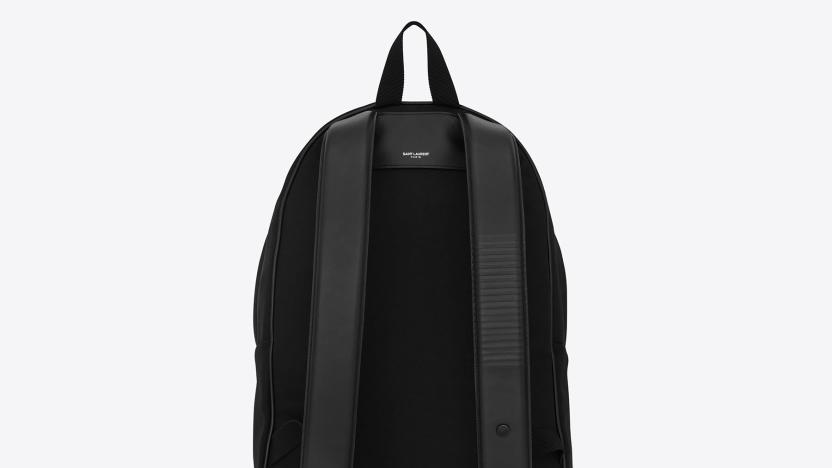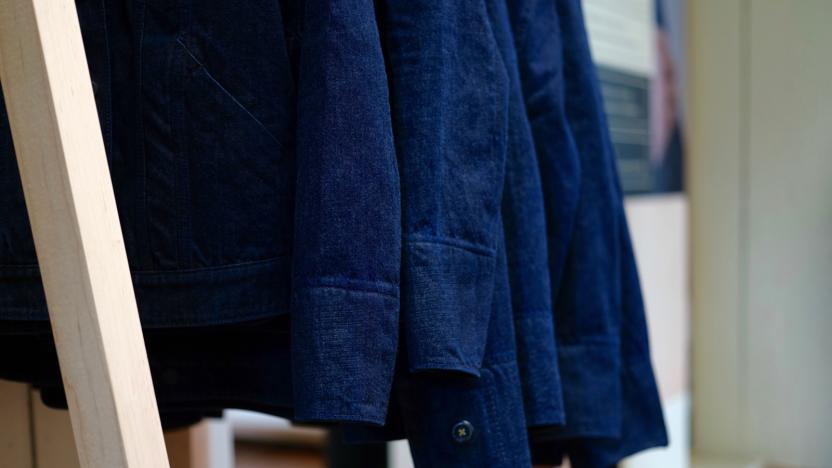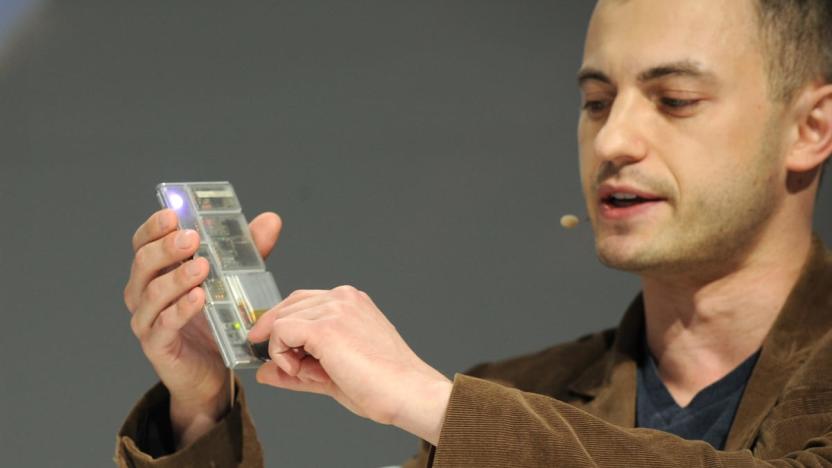atap
Latest

Google and Samsonite’s smart backpack is a better use of Jacquard
It’s exactly the sort of backpack I would take to tradeshows.

Pixel 4 XL teardown reveals remarkably tiny Soli chip
When Google announced the Pixel 4 earlier this month, the company's Sabrina Ellis spent a part of the keynote talking about the work her team invested in making Project Soli into something that could fit inside of a smartphone. It turns out Ellis wasn't overstating things: the radar chip is so small, the repair experts at iFixit had trouble finding it when they recently took apart the Pixel 4 XL.

Google and Levis' second jacket is smarter, but still a novelty
You wouldn't normally think of Google as a maker of clothing, but the company has been working on a platform for connected apparel and accessories for awhile now. Four years ago, it teased Jacquard, a platform involving touch-sensitive threads that can be woven into fabrics to make them "smart." The first Jacquard-enabled smart jacket launched in 2017, giving us a glimpse at the potential of this system. But it had limited use and appeal. It specifically targeted people who bike to work. An update arrived last year, making Jacquard slightly more useful. But, there's a lot more work to be done, and Google is ready to show us what's next with an updated and cheaper version of the smart jacket.

Google's latest wearable is an Yves Saint Laurent backpack
Google hasn't given up on Jacquard, an experimental hardware project designed to make everyday clothing and accessories smarter. As spotted by Owen Williams (Charged), the company has teamed up with fashion titan Yves Saint Laurent on a decadent and mildly smart backpack. The "connected" bag comes with a tiny module that slots into a hole in the main compartment. It connects to the Jacquard app and turns the backpack's left strap into a swipe-based control panel for your phone. The manual says there are four different input gestures -- brush down, brush up, double tap and cover -- and a circular nub that delivers custom alerts.

Google wins FCC approval to keep developing radar-based hand sensor
Google's Advanced Technology and Projects (ATAP) team has been working on Project Soli since 2015. The gesture-based system uses broad beam radar to detect and capture hand movements, turning them into commands for mobile devices. Until now, though, the tech has been restricted, with some companies -- including Facebook -- claiming that the high frequency levels required might interfere with existing technology. Now, the FCC has granted a waiver that will allow Soli to operate at higher levels than currently allowed, and therefore continue development as Google originally intended.

Head of Facebook’s future lab will leave early next year
It's only been 18 months since Facebook enticed Google's advanced technology lead, Regina Dugan, to work at the social network's secret hardware lab, Building 8. Before starting Google's Advanced Technology and Projects group (ATAP) , Dugan worked as the director of DARPA, the US government's out-there research agency. Now the executive is moving on yet again. According to a Facebook post, Dugan will be leaving the social network "early next year ... to focus on building and leading a new endeavor."

Fashion and technology will inevitably become one
There's no denying that the technology world is obsessed with fashion. Amazon, Apple and Google, three of the biggest names in tech, are all trying to carve their own path into the fashion space. Apple's doing so with fancy smartwatches; Amazon with a shopping platform and voice-controlled cameras; and Google with conductive fabrics embedded in a smart jacket made by Levi's. And the interest is mutual. Fashion designer Karl Lagerfeld, Chanel's creative director, has expressed his love for tech by experimenting with partially 3D-printed pieces and runway shows that simulate a rocket launch. He's not the only one either. Zac Posen, with help from fashion house Marchesa, worked with IBM's Watson supercomputer to create a cognitive dress that lights up and changes colors based on activity on social media.

The Levi's Commuter smart jacket has a ton of promise
Google's mission with its Advanced Technology and Products group is to create innovations like Project Jacquard, which can turn objects into interactive, gesture-controlled surfaces. With the Levi's Commuter jacket, introduced in 2016, the technology comes to life through a conductive fabric and a Bluetooth device that attaches to the garment. The connected area consists of 15 threads on the left sleeve, just visible enough for you to know where to touch to trigger actions from a paired smartphone.

The smart jacket from Google and Levi's arrives this fall for $350
It's been nearly two years since Google and Levi's announced their plans to work on connected garments, an idea born out of the tech giant's Advanced Technology and Products group. The first piece of this project is a connected jacket called the Commuter, which uses Google's Jacquard technology to turn its denim fabric into a gesture-controlled canvas. Although we knew it'd be launching as a consumer product eventually, until today both the price and ship date were unknown. But at SXSW, during a panel titled Beyond the Screens: the Ubiquity of Connectivity, Google and Levi's revealed that the smart trucker jacket will arrive this fall for $350.

Project Ara's death is bad news for the weird side of Google
Last week, Google announced that it was killing Project Ara, the company's modular smartphone initiative. Ara was easily one of the coolest and strangest things Google was working on, but the project always felt like a bit of a longshot. In this world of carefully-built, sealed-up iPhones and Galaxy devices, it didn't feel like there was much room for Ara's intriguing but bizarre swappable hardware modules. But Ara was one of the best examples out there of "Weird Google," and Ara's death is the latest clue that the experimental side of the company might be in trouble.

$500 Lenovo Phab2 Pro is the first Google Tango phone
The second generation of Lenovo's Phab phones are here already, headlined by the first-ever Project Tango-equipped smartphone with sensors and cameras that can map its surroundings. The Phab2 Pro (check out our hands-on impressions right here) is special because it fulfills the promise of demos that Google's Advanced Technologies and Products (ATAP) division has been showing us for a few years. The phone's dual cameras create an "eye" that sees its surroundings in 3D with depth perception, while additional sensors monitor location and nearby objects 250,000 times per second.

Inhabitat's Week in Green: A VW bug made out of timber
Six years ago a Beijing company proposed an insane lane-straddling bus that could soar over congested freeways. The project just took a step closer to reality, as the Transit Explore Bus is set to begin testing this summer. In other transportation news, Airbus just unveiled the world's first 3D-printed motorcycle, which has a range of 37 miles and a top speed of 50 mph. Hyperloop Transportation Technologies announced plans to build transit pods from Vibranium, which takes its name from the fictional metal used to create Captain America's indestructible shield. A Bosnian retiree handcrafted a gorgeous VW bug exterior from over 50,000 pieces of oak. Vanmoof launched the SmartBike -- a next-gen cycle that is virtually impossible to steal -- and Google partnered with Levi's to create a smart jacket for urban cyclists.

Android will have password-free sign-ins by the end of 2016
Back in 2015, Google teased the prospect of Project Abacus, a sign-in approach for Android that ditches passwords in favor of a trust system that uses patterns (such as location, typing speed and voice) to verify your identity. But when is it coming out? Sooner than you might think, actually. In a low-key presentation at I/O 2016, Google revealed that Abacus should be in developers' hands by the end of the year. Multiple "very large financial institutions" will start trying it out in June, taking a big step forward from the university tests that began last year.

Google controls a smartwatch with radar-powered finger gestures
Last year, Google gave us a taste of Project Soli, an effort to deliver radar-powered finger gesture control to wearables. Today, we got a closer look at how it could be implemented in real products, starting with a customized LG Urbane smartwatch. Google reps were able to control the watch simply by holding their fingers in front of it. As they moved closer, even more options opened up. As they moved away, the standard watch face returned. It's just a demo right now, but Soli could solve the problem of controlling smart devices with tiny screens (or with no screens at all).

Google aims to launch its consumer Project Ara phone in 2017
Despite some grim portents last year, Google's "Project Ara" modular smartphone is far from dead. For starters, it now has its own business unit within Google's mysterious Advanced Technology and Projects (ATAP) group, and the nearly magical modular hardware we've been anticipating for years is indeed getting closer. ATAP Head of Creative Blaise Bertrand confirmed at Google's I/O conference today that a new developer phone will be available in Q4 of this year with a "thin, light, beautiful" consumer Ara phone to follow in 2017.

Google and Levis are releasing their smart jacket early next year
Google and Levis announced a partnership at Google I/O last year that would bring "smart clothing" to the market using a technology codenamed Project Jacquard. The tech, which is basically composed of conductive fabric woven into the garment to create an interactive patch that senses touch, pressure and even your hand's position before you touch the fabric. It's a wild idea, and this year Google's Advanced Technology and Products (ATAP) group is showing it off in an upcoming product: the Levis Commuter jacket with Jacquard technology built right in.

Google grabs ex-Motorola president to unify its hardware groups
Rick Osterloh, former president of Motorola, is now Senior Vice President at Google in charge of a new hardware division that includes the company's Nexus devices, living room gadgets and Glass, Re/code reports. This means Nest CEO Tony Fadell is no longer leading Google's Glass initiatives, a role he took on in January 2015, though he'll stay on as a team adviser. Osterloh is no stranger to Google -- he led product development during Motorola's tenure under Google and helped develop the Moto X, Moto 360 and early Droid efforts.

Facebook poaches Google's advanced technology lead
Facebook just scored a big coup in its longstanding rivalry with Google. The company has hired Regina Dugan, Google's Advanced Technology Technology and Projects leader (think Ara and Tango), to lead a new team at the soon-to-be-built Building 8. Just what the former DARPA leader be doing there isn't evident, but she tells Forbes that her group will rely on "ambitious R&D" to make "breakthrough" hardware that leans on Facebook's technological skills. It'll be in sync with the ambitious 10-year roadmap Facebook unveiled at F8 on April 12th. There, the long-term goals included getting people connected, developing artificial intelligence and fostering wearable tech like virtual reality.

Project Ara delayed because its phones keep falling apart (update: apparently not)
Project Ara, the modular mobile phone from Google's Advanced Technologies and Projects (ATAP) group, has hit some delays, and now we're getting a hint as to what went wrong. The Project Ara team announced on Twitter that the the "electropermanent" magnets that held the different Ara modules together are not strong enough to keep the phone from surviving falls in a drop test. Unfortunately, there's no word on what it will be replaced with, outside of an enigmatic tweet about testing a "signature experience" for attaching and detaching modules.

Project Ara will 're-route' market pilot for its modular smartphone
After going a while between updates, Project Ara has sent out a confusing series of tweets suggesting plans for the modular smartphone could change. We don't know if this has anything to do with the recent Google / Alphabet restructuring, but its official Twitter account says the team has been busy "making stuff", and that details on a "Market pilot re-route" are coming soon. We were expecting to see the Google-backed platform debut in Puerto Rico, but that is no longer a certainty. The account finished up by saying "this is not a goodbye" to the island, and left us awaiting further updates next week. Given recent events, we guess it's good to know the lights are still on, but anyone waiting for the chance to piece together their own smartphone will have have to stay tuned. [Image credit: Bryan Bedder via Getty Images]












